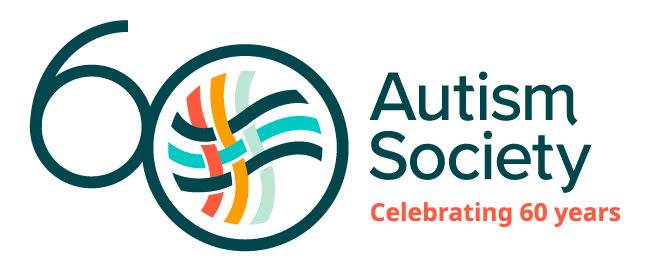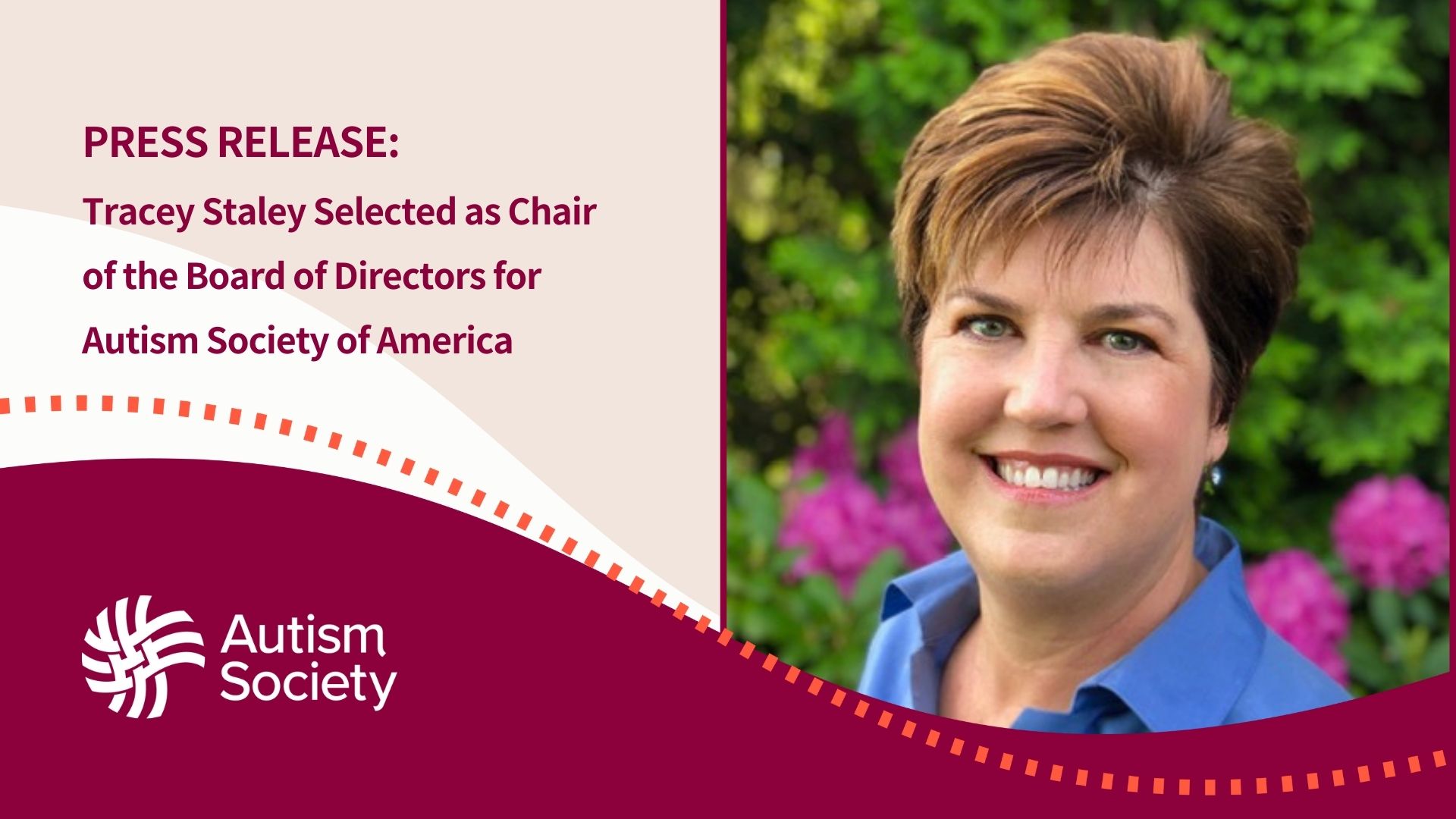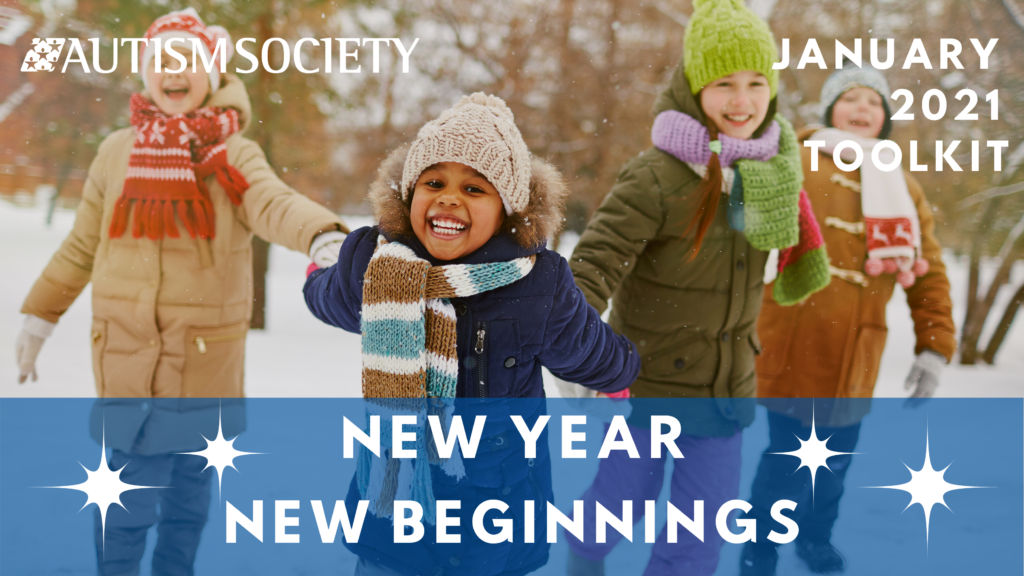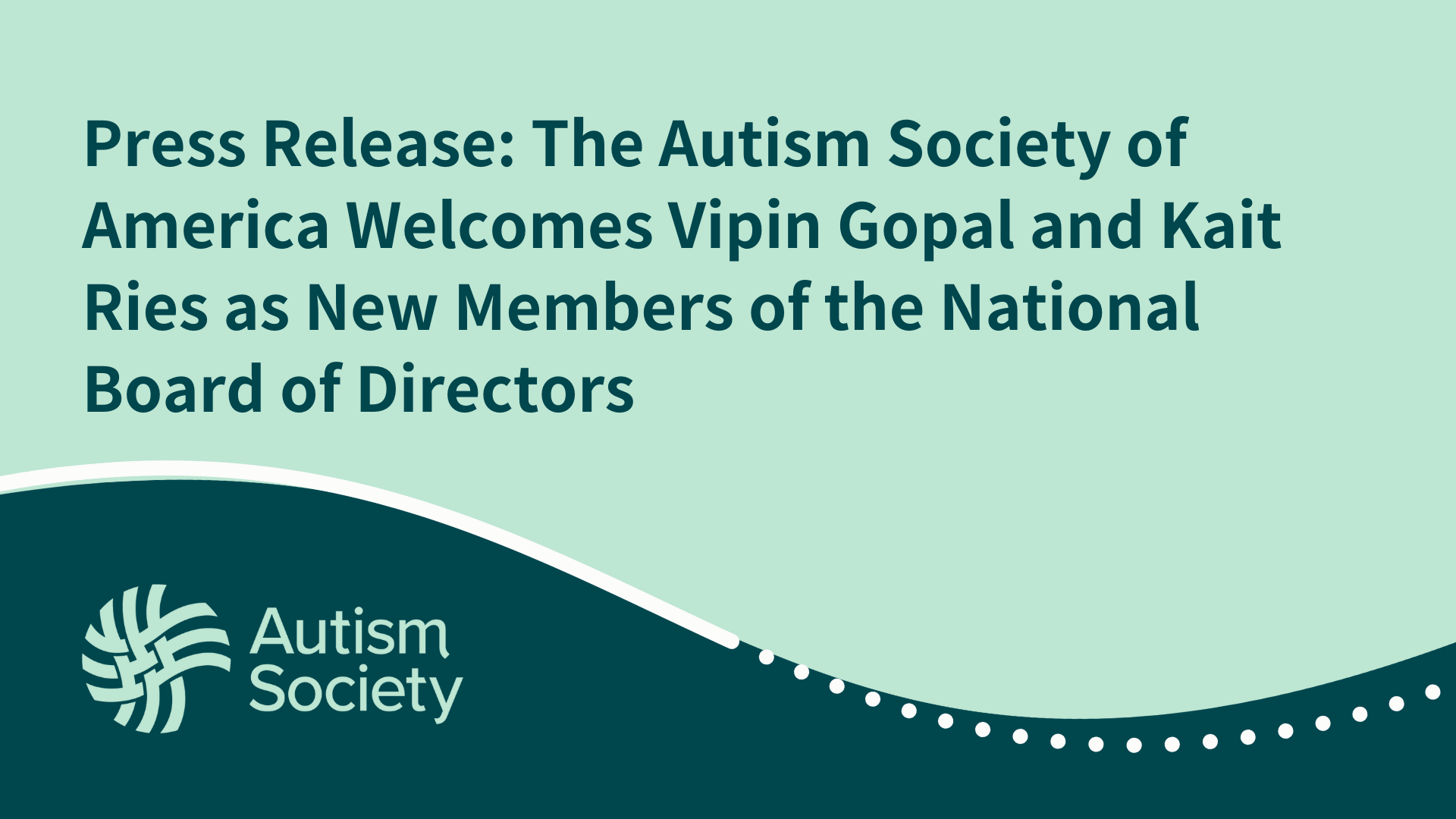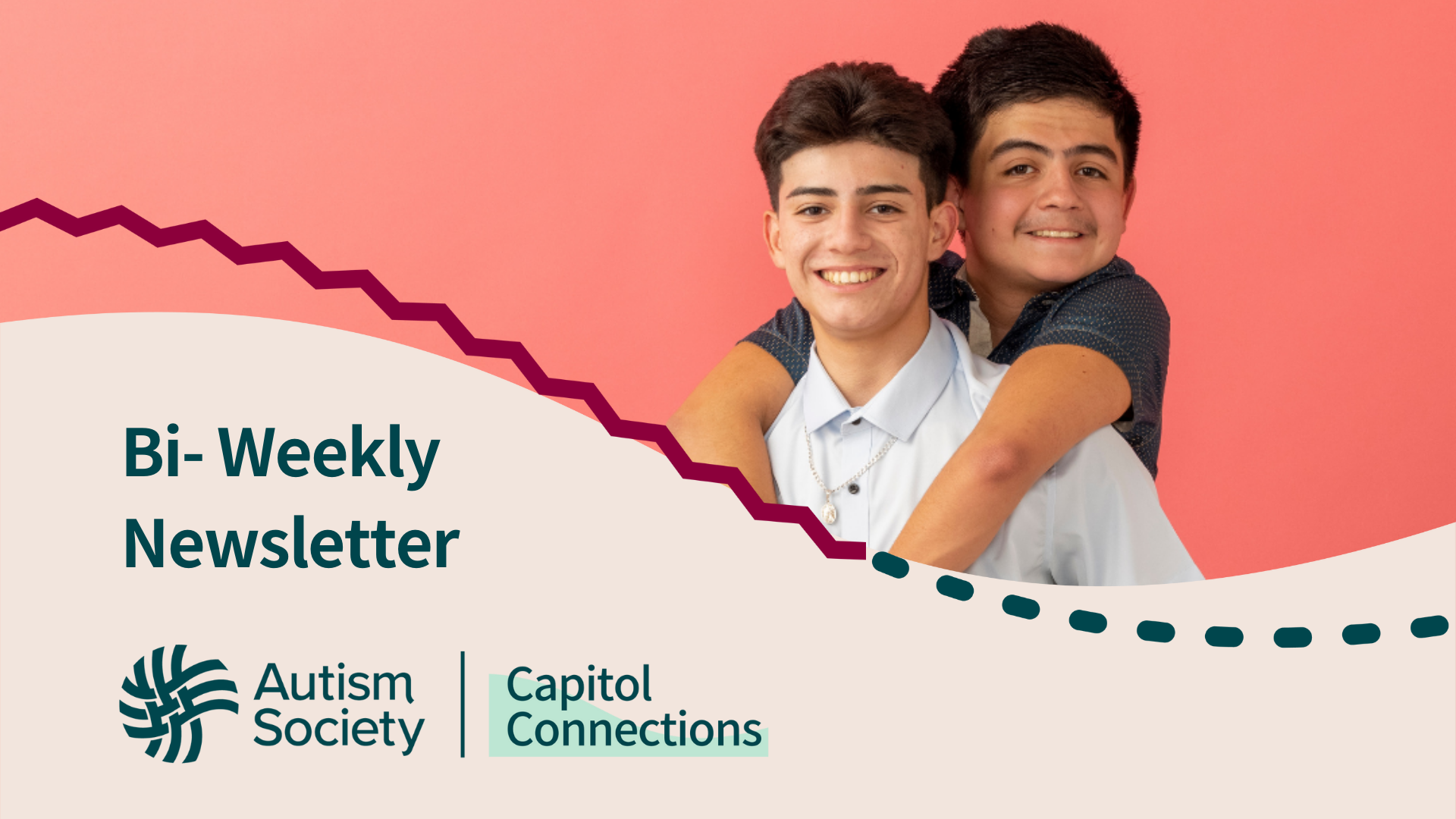
In this issue of Capitol Connection, the Autism Society’s policy newsletter, see updates on the ABLE accounts, Build Back Better Act, and voting rights legislation. Also, review new policy announcements related to Social Security, Medicaid and mental health, and education. Remember, the Autism Society’s Action Center provides easy steps for advocates to educate Congress about these and other issues impacting the Autism community.
Build Back Better Act
Senate leaders do not have the 51 votes needed to pass the Build Back Better Act at this time and so have postponed a vote on it. The legislation continues to be a high priority for the Autism Society of America, given its historic investment in-home and community-based services, caregiving, behavioral health, special education, and other supports that assist families. The Autism Society encourages its affiliates and allies to continue to educate their Members of Congress about the need to adequately fund programs that connect people with Autism and families to needed services and supports (read this Issue Brief for talking points on the need to increase investment into HCBS for talking points to use).
Appropriations and the President’s Budget
The appropriations bills for the fiscal year 2022 that began on October 1, 2021, have not yet been finalized. To prevent a shutdown of those programs, Congress passed a continuing resolution through February 18, 2022. The Autism Society continues to urge Congress to finalize the appropriations bills that have important investments for people with autism and other disabilities.
Due to this delay in appropriations, the transmission of the President’s FY 2023 Budget proposal is also expected to be late, likely in March instead of early February. President Biden is scheduled to give his State of the Union address on March 1, 2022. The Autism Society will be watching for the President’s overall budget and legislative priorities as they impact people with autism.
Voting Rights Legislation
The congressional leadership in the House and Senate have shifted priorities to passing the Freedom to Vote Act (S. 2747) and the John Lewis Voting Rights Act (HR 4) as soon as possible in order to protect elections and the right to vote for all.
For people with autism and other disabilities, the Freedom to Vote Act ensures all information and necessary documents to vote are electronically accessible, ensures people with disabilities have the option to vote by absentee ballots; creates an office in each State that oversees accessibility for people with disabilities; requires State partnership with organizations to monitor accessibility on voting websites, and ensures polling places are accessible.
The American Association of People with Disabilities REV UP campaign works toward advancing voting accessibility for people with disabilities. AAPD is hosting its first-ever orientation called “Join the REV UP Network” on Wednesday, January 19, at 2 pm EST to discuss what REV UP is about and how people can get involved in the project.
ABLE Accounts Increase
For the first time since 2018, the IRS is allowing the annual amount saved to ABLE Accounts to be raised to $16,000 (from $15,000) in 2022. ABLE Accounts allow individuals with disabilities to save money without risking eligibility for Medicaid, Social Security, and other government benefits. To be eligible for an ABLE Account, individuals must have a disability that onset before age 26. The ABLE Age Adjustment Act has been proposed in both the Senate and the House to increase the age requirement to 46 and has garnered bipartisan support. For more information on ABLE accounts, visit the ABLE National Resource Center.
Senate Hearing on COVID
The Senate Health, Education, Labor and Pensions (HELP) Committee, chaired by Patty Murray (D-WA.) held a hearing on “Addressing New Variants: A Federal Perspective on the COVID-19 Response.” Witnesses were: Rochelle Walensky, director of the Centers for Disease Control and Prevention, Anthony Fauci, director of the National Institute of Allergy and Infectious Diseases; Janet Woodcock, acting commissioner of the Food and Drug Administration; and Dawn O’Connell, assistant HHS secretary for preparedness and response. In response to a question from Senator Casey (D-PA), Walensky discussed how important it is to protect people with disabilities who are more vulnerable to COVID. She also said she was planning to meet with disability community leaders this week. Watch an archived recording of the meeting on the committee website.
New Medicaid Mental Health Option
The Department of Health and Human Services, through the Centers for Medicare & Medicaid Services, is working with states to promote access to Medicaid services for people with mental health and substance use disorder (SUD) crises. Authorized under President Biden’s American Rescue Plan, states have a new option for supporting community-based mobile crisis intervention services for individuals with Medicaid. Mobile crisis intervention services are tools to meet people in crisis where they are and provide critical services to people experiencing mental health or substance use crises by connecting them to a behavioral health specialist. This new option will help states integrate these services into their Medicaid programs. For states that already have a program, funding will be available for three years to offer the opportunity for expansion. To access the Medicaid Guidance on Coverage and Reimbursement for Qualifying Community-Based Mobile Crisis Intervention Services, visit the Medicaid resource.
Social Security
The Social Security Administration (SSA) published new Instructions for Reopening and Reevaluating SSI Claims Denied due to COVID-19 Disaster Assistance (Emergency Message, EM-20169), on December 9, 2021. SSA is now reopening hundreds of thousands of applications for Supplemental Security Income (SSI) benefits that they previously denied from March 2020 to current. While some cases will be automatically reviewed, other cases will need to be brought to the agency’s attention in order to correct errors related to a person’s receipt of disaster assistance.SSA has identified some people who have been denied and mailed them. Other SSI denials will not be mailed, but one can still contact SSA to request that their application be reopened and revised, following the guidance in this Emergency Message. This is especially important for those whose claims for SSI were denied for being over the resource limit because SSA erroneously counted their Economic Impact Payments (EIPs), also known as stimulus payments, as a resource. Read the update published by SSA for more detail.
Education
On December 21, the U.S. Department of Education released the 2022 application for the Statewide Family Engagement Centers program. Statewide organizations or consortia in partnership with at least one State Education Agency, are invited to apply for funds to establish Statewide Family Engagement Centers that (1) carry out parent education and family engagement in education programs, and (2) provide comprehensive training and technical assistance to states, districts, and schools identified by states and districts, organizations that support family-school partnerships, and other such programs. The Department will provide up to $5 million for an estimated 5-7 new grants with an estimated first-year grant award of $500,000 to $1 million per grantee. Grantees will receive annual grant funds over a period of five years. Affiliates are encouraged to work with State Education Agencies to encourage them to apply and incorporate parents of students with autism.
Policy Resources
The Center for American Progress poverty team and Disability Justice Initiative published a new issue brief, “Alleviating Food Insecurity in the Disabled Community,” which explores long-standing policy and other barriers to food security and access for disabled people in the United States in the context of the COVID-19. This paper explores a few of the ways people in this diverse community have been impacted, including profiles of community resource centers that help to support people with disabilities in their own communities. The brief includes the following policy recommendations to the federal government:
- Expanding the definition of disability for programs like the Supplemental Nutrition Assistance Program (SNAP),
- A call for the inclusion of people with disabilities in all aspects of food systems data collection, and
- Making permanent the USDA’s Online Pilot Program, which has enabled people in some areas to use SNAP to make online grocery delivery purchases.
Read the report here.
Share:

